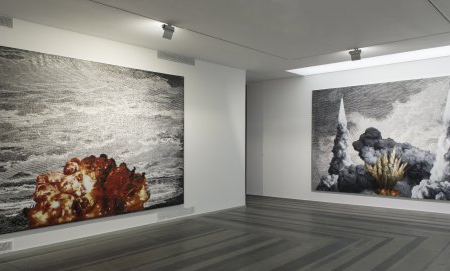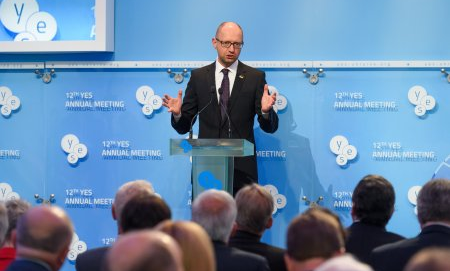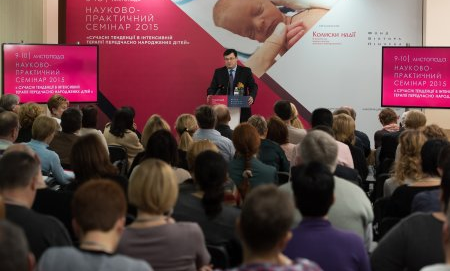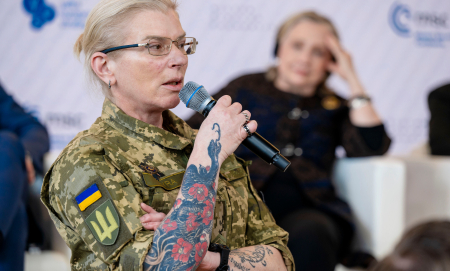News
Timothy Snyder Gives Public Lecture “Ukraine and the Future of Europe” at the Invitation of the Victor Pinchuk Foundation
On Thursday, 20 June 2019, Timothy Snyder, the Richard C. Levin Professor of History at Yale University and a permanent fellow at the Institute for Human Sciences in Vienna, gave a public lecture, “Ukraine and the Future of Europe.” He came to Kyiv at the invitation of the Victor Pinchuk Foundation as part of its Public Lectures programme.
Ukrainian students, scholars, opinion-makers as well as the recipients of the Victor Pinchuk Foundation’s Zavtra.UA and WorldWideStudiesscholarships took part in the event.
Introducing the speaker, Victor Pinchuk, businessman and philanthropist said: “We need to dig deep down to the roots of today’s challenges. Tectonic changes are happening in the world now. Even the best politicians can only respond to them if they know their roots. Thinkers – historians, philosophers, psychologists, and others – can show what to think about, to understand what is happening in today’s world.”
During the lecture, Timothy Snyder spoke about the link between the past and the future, the importance of understanding the past in order to shape and see future, and the place of Ukraine in the processes on the continent at every important turning point from the historical perspective.
Opening the lecture, Mr. Snyder said: “It is impossible to have a future if you cannot think about the past. If you do not know where you are coming from, there is no way that you know where you are going. This is a basic problem of democratic politics today. We are all stuck in a permanent “now”. Whereas if you want to have a democracy, you need to be able to say: here are the projects, here are the facts, here is how we can move forward. Without a future, there is no democracy, but also, without democracy, there is not a future. The ability to think about what is behind us is an essential part of thinking about what is ahead of us.”
Reflecting on the major issue in Europe’s history, Mr. Snyder stressed: “The big question of European history is what you do after empire. The history of Europe is a history of empire. The tragedies of the 21stcentury are tragedies that have to do with attempts to make empire continue. The only story that matters in European history is what you do after empire. In this story, Ukraine plays an absolutely central role because Ukraine is at the very centre. Ukraine is the country that has suffered the most in the mainstream of European history. The grand transformation in European history has been the end of empire and the creation of a Europe which brings states together.”
Speaking about the place of Ukraine in the processes in Europe at different historic moments, Mr. Snyder said: “At every single turning point in European history Ukraine has been there. At every point where we moved from one kind of state to another kind of state, one political system to another, this place has always been at the centre. There are two reasons why the past tells us that Europe’s future depends very much on Ukraine. The first is the question how do you get from empire to Europe, and it has to involve Ukraine. The second is that at every other major turning point, Ukraine was at the centre. History is about structures and choices. And if you know something about structures, then you can make more informed choices. The more you know about the past as it actually was, then you can really find your way to see what are the possibilities for your future which are not obvious.”
Elaborating on the theme for the lecture, Mr. Snyder underlined:“Europe needs you, but nobody knows that. Very often one side needs another side, but they do not know it. Europe’s relationship with Ukraine is very much like this. If Europe is going to continue to exist, it is going to exist by expanding and getting new members, and the most important of them is Ukraine. What Europe needs more than anything else is a future. Europeans are very comfortable about the past. European politics are comfortable with the present in talking about how the past was bad and maybe the present is better. But you may have noticed that somewhere along the way the future got murdered. In Europe nobody is able to talk about the future. Everybody is worried about populism and thinks that it is a big problem. But populism is democracy minus the future. Europe’s problem with populism is not knowing what the future is or being afraid of the future. For a while, Europe had a future that was called enlargement. The Europeans do not know they need a future. The process of enlarging the European Union until 2013 was giving the EU a future. What Ukrainians can offer to Europeans who need a future? Future by its nature is unpredictable. We do not know of whether or not Ukraine is going to play an important role in the European imagination. It could. Europe needs more imagination, and it needs to have visions and possibilities, and Ukraine might be able to supply some of those.”
Additionally, on that same day, as a special guest, Timothy Snyder took part in the 12th Annual Youth Forum of the Victor Pinchuk Fondation’s Zavtra.UA and WorldWideStudies (WWS) scholarship programmes, where he gave a speech during the ceremony of awarding the programme scholars.
As a part of its Public Lectures project launched in 2006, the Victor Pinchuk Foundation regularly invites leading thinkers, politicians and public figures to Ukraine to discuss challenges facing the world and Ukraine. By organizing such a dialogue between world leaders and Ukrainian students, the Foundation has for more than a decade contributed to fostering a new generation of responsible leaders.
In previous years, lectures were given, among others, by Tony Blair, Prime Minister of Great Britain (1997-2007); David Cameron, Prime Minister of the United Kingdom of Great Britain and Northern Ireland (2010-2016); Bill Clinton, the 42nd President of the United States; Niall Ferguson, historian, writer, senior fellow at the Hoover Institution, Stanford University, and at the Center for European Studies, Harvard; Joschka Fischer, Vice Chancellor of Germany (1998-2005); Thomas Friedman, The New York Times columnist and three-time Pulitzer Prize winner; Francis Fukuyama, Professor of International Political Economy at Johns Hopkins University; Newt Gingrich, the 50th Speaker of the United States House of Representatives; Rudy Giuliani, the 107th Mayor of New York City;Dr. Michio Kaku, Henry Semat Professor of Physics; John Kerry,68th United States Secretary of State; Shimon Peres, the 9thPresident of Israel; Colin Powell, the 65th US Secretary of State; Dr. Condoleezza Rice, the 66th United States Secretary of State (2005-2009); Javier Solana, High Representative for Common Foreign and Security Policy of the European Union (1999-2009) and Secretary General of NATO (1995-1999); Dominique Strauss-Kahn, Managing Director of the International Monetary Fund (1998-2005); Jimmy Wales, Founder of Wikipedia and Wikimedia Foundation; James Wolfensohn, the 9th President of the World Bank Group; Muhammad Yunus, 2006 Nobel Peace Prize Laureate, and others.
Timothy Snyder is the Richard C. Levin Professor of History at Yale University and a permanent fellow at the Institute for Human Sciences in Vienna. He speaks five and reads ten European languages. His eight chief books are Nationalism, Marxism, and Modern Central Europe: A Biography of Kazimierz Kelles-Krauz (1998); The Reconstruction of Nations: Poland, Ukraine, Lithuania, Belarus, 1569-1999 (2003); Sketches from a Secret War: A Polish Artist’s Mission to Liberate Soviet Ukraine (2005); The Red Prince: The Secret Lives of a Habsburg Archduke (2008); Bloodlands: Europe Between Hitler and Stalin (2010), Thinking the Twentieth Century (with Tony Judt, 2012); Black Earth: The Holocaust as History and Warning (2015); On Tyranny: Twenty Lessons from the Twentieth Century (2017); and The Road to Unfreedom: Russia, Europe, America (2018). Snyder co-edited three further books: The Wall Around the West: State Borders and Immigration Controls in Europe and North America (2001); Stalin and Europe: Terror, War, Domination (2013); and The Balkans as Europe (2018). His essays are collected in Ukrainian History, Russian Politics, European Futures (2014), and The Politics of Life and Death(2015).
Snyder's work has appeared in forty languages and has received a number of prizes, including the Emerson Prize in the Humanities, the Literature Award of the American Academy of Arts and Letters, the Václav Havel Foundation prize, the Foundation for Polish Science prize in the social sciences, the Leipzig Award for European Understanding, the Dutch Auschwitz Committee award, and the Hannah Arendt Prize in Political Thought. Snyder was a Marshall Scholar at Oxford, and has received the Carnegie and Guggenheim fellowships, and holds state orders from Estonia, Lithuania, and Poland. He has appeared in documentaries, on network television, and in major films. His books have inspired posters, sculpture, punk rock, rap, film, theater, and opera. His words are quoted in political demonstrations around the world. He is currently researching a family history of nationalism and writing a philosophical book about freedom.























